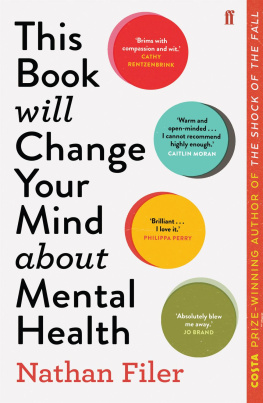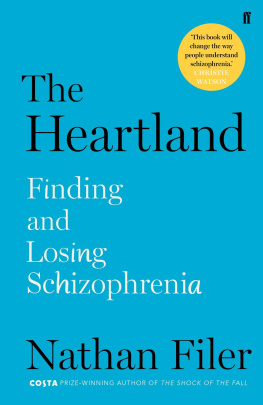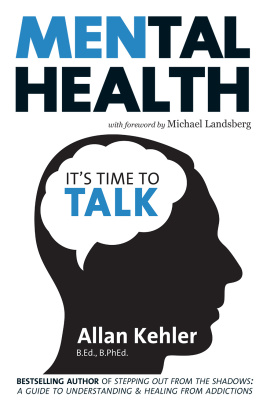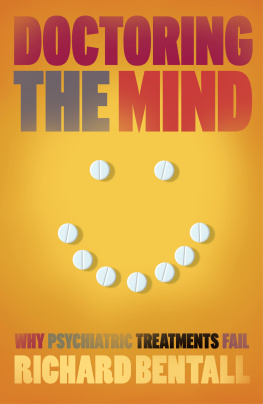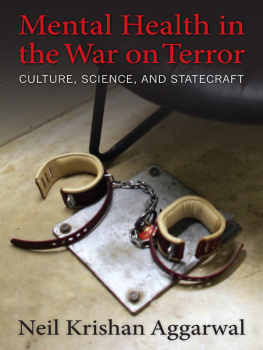SOME OF THE PEOPLE you will encounter in this book have not been anonymised and no details of their stories have been changed. Others have been anonymised to greater or lesser degrees. Sometimes a name change was all that was requested. Elsewhere, Ive altered locations, dates and other identifying details. These decisions were made by the people whose stories I recount. NF
I REMEMBER THE FIRST TIME that I forcibly medicated a person against his will. It was thirteen years ago, not long after Id qualified as a mental health nurse, and I had started my career working on a psychiatric ward providing assessment and treatment for adults in acute phases of serious mental illness.
There was a patient (or service user or client or son or brother or friend, depending on who you ask) whom Ill call Amit. Amit had been refusing any medication for nearly three weeks and with good reason. The medicine we were offering him contained a poison. It had been prescribed by a doctor who wished to harm him. In fact, this doctor a consultant psychiatrist had been struck off the medical register for his abuse of Amit during previous admissions and so was now working illegally on the ward. Many of the nursing staff knew this, and were in on it.
During morning medication round, Amit stood in the doorway of the ward clinic, watching me closely. He watched the movement of my hands over the drugs trolley as I secretly replaced his regular tablets with harmful ones.
He was wearing the same clothes that hed slept in and a pair of old trainers, one with a huge split down the side. Another patient (or colleague or mother or teacher or daughter) had recently complained about Amits smell. Whenever he sat in the TV lounge, she said, it made her feel physically sick. The problem was that Amit knew the water supply to his room was deliberately contaminated and so hadnt washed since he was admitted. I would try to talk to him about that again later to find the right words but for now, at least, the medication was the priority.
I double-checked the dose on his chart, put two tablets into a clear plastic pot and held it out for him to take.
He stared at it. We both did. I tried some words of reassurance. I know youre finding it hard to trust us at the moment, Amit. I do understand that. We think thats all a part of you being unwell again.
He knew I was lying.
Ill take them in my room, he said.
I knew he was lying.
You know it doesnt work that way. Im sorry, but I need to see you take them.
He cautiously reached out and took the pot from me. He prodded at the tablets inside. His fingers were stained dark yellow from tobacco. Nah. Youre all right, he said at last, placing the pot on top of the drugs trolley and backing out of the clinic, watching me the whole time. As he disappeared down the long corridor towards his bedroom, I wrote an R for Refused on his medication chart. Of course he refused. Why wouldnt he refuse? If I were in his position, I know I would.
But I dont know if I would refuse with the same dignity he showed when later that afternoon the C & R team entered his bedroom.
C & R. Control and Restraint. The legal (if controversial) techniques that mental health nurses are trained in to render a person unable to fight back. In subsequent years, this training would be rebranded as Prevention and Management of Violence and Aggression, which is reasonable if a person is smashing up the ward or threatening to hurt someone, but at times like this, for my money, the first description felt more honest.
It had been decided in a team meeting led by the consultant psychiatrist that this was the last day Amit could refuse oral medication before we would use an injectable form. In the parlance of psychiatry: his mental state was deteriorating daily; he was well known to mental health services; and this was a typical presentation and pattern of his illness. If we could get him back on a stable dose of medication hed likely respond well.
Amit was sitting on his bed, smoking and tuning through the static on a portable radio. He was talking to somebody that none of us could see. He looked up. There were five of us.
Do I have to beg you? he asked.
A colleague of mine explained his options, such as they were. But thats the bit that stayed with me. Do I have to beg you? Its why I struggled to keep my hands from shaking as he was eventually held down on his bed and I administered the injection. He didnt put up a fight. We werent preventing and managing violence and aggression. From Amits perspective, I dont doubt we were perpetrating it. In that moment, however good my intentions, I was knowingly participating in his suffering.
*
It was around this time that I began to write a novel. I was living in a small shared flat in inner-city Bristol, and between shifts on the ward I would sit for long hours at my desk or more often pace the floorboards in the hope that the physical movement of my body might somehow dislodge some inspiration from whatever stone in my brain it was hiding beneath.

